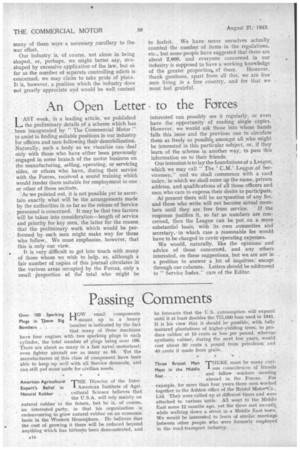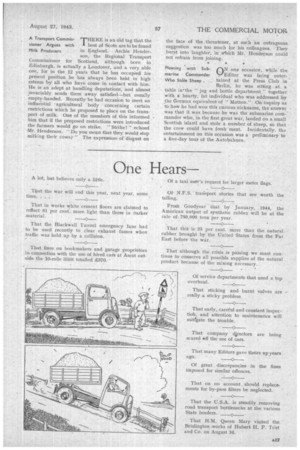Passing Comments
Page 18

Page 19

If you've noticed an error in this article please click here to report it so we can fix it.
Over 100 Sparking HOWsmall components Plugs n Those Big mount up in a heavy Bombers bomber is indicated by the fact
that many of these machines have four engines with two sparking plugs in each cylinder, the total number of plugs being over 100. There are about as many in a fast naval motorboat; even fighter aircraft use as many as 50. Yet the manufactuiers of this class of component have been able to keep up well with all Service demands, and can still pui some aside for civilian needs.
American Agricultural r-r-IE Director of the Inter Expert's Belief in I American Institute of AgriNatural Rubber . . cultural Science believes that
the U.S.A. will rely mainly on natural rubber in the future, but he is, of course, an interested party, in that his organization is endeavouring to grow natural rubber on an economic basis in the Western Hemisphere. He believes that the cost of growing it there will be reduced beyond anything which has hitherto been demonstrated, and he forecasts that the U.S. consumption will expand until it at least doubles the 775,000 tons used in 1941. It is bis view that it should be possible, with fully matured plantations of higher-yielding trees, to pro duce rubber at 10 cents or less per pound, whereas synthetic rubber, during the next few years, would cost about 30 cents a pound from petroleum and 40 cents if made from grain.
Three Bristol Men THERE must be many curiMeet in the Middle I ous coincidences of friends
East and fellow workers meeting abroad in the Forces. For example, for more than four years three men worked together in the Ashton office of the Bristol Motor•Co., Ltd. They were called up at different times and were attached to various units. All went to the Middle East some 12 months ago, yet the three met recently while walking down a street in a Middle East town. We would be interested to learn of similar meetings between other people who were formerly, employed in the road-transport industry.
A Transport CommisT'HERE is an Old tag that the
sioner Argues with I best of Scots are to be found Milk Producers in England. Archie Hender
son, the Regional Transport Commissioner for Scotland, although born in Edinburgh, is actually a Londoner, and a very able one, for in the 12 years that he has occupied his present position he has always been held. in high esteem by all who have come in contact with him. He is an adept at handling deputations, and almost invariably sends them away satisfied—but usually empty-handed. Recently, he had occasion to Meet an influential -agricultural body concerning certain restrictions which he proposed to place on the transport of Milk. One of the members of this informed him that if the proposed restrictions were introduced the farmers would go on strike. "Strike I " 'echoed .Mr.. Henderson. "Do you mean that they would stop milking their cows? " The expressionof disgust on
the face of the threatener, at such 'an outrageous • suggestion was too much for his colleagues. They burst into laughter, in Which Mr. Henderson could not refrain from joining.
fleecing with SubnN one occasion, while the marine Commander `t-lEditor was being entertained at the Press Club in Berlin, he was sitting at. a table in.the " jug and, bottle department," together with A hearty, fat individual who was addressed. by the German equivalent of " Mutton." On inquiry as to how he had won this curious nickname, the answer was that it Was because he was the submarine coinmander who, in the first great war, landed on a small Scottish island and stole a number of sheep, so that the crew could have fresh meat. Incidentally, the entertainment on this occasion was a preliminary to a five-day tour of the Autobahnen.
Who StC4e Sheep . .




















































